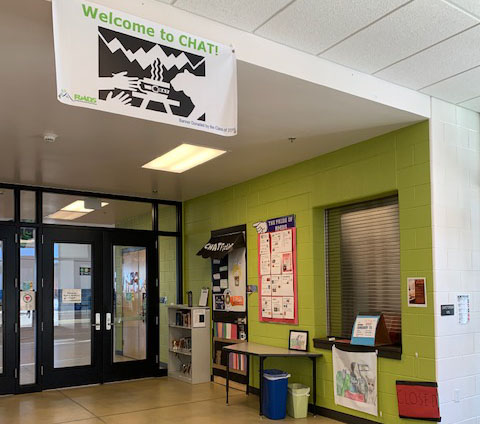Editor’s note: Heather Hapke from Rocky Mountain Deaf School agreed to share details about the school’s job training program, which includes an on-campus coffee shop, job shadowing and internships, a summer program, and more.
We at Rocky Mountain Deaf School are honored to be a part of the Trending Topic Tuesday Spotlight as we discuss our history and the successes of our program.
I am the Transition Teacher and was brought on in 2016 to provide instruction and data collection to meet the needs of our Transition IEPs, which are required for students who are 14 and older in the state of Colorado.
A Transition IEP requires that students have career exploration opportunities to determine an appropriate career and post-secondary education goal that will guide the rest of their academic goals as they go through high school. In some cases, independent living goals are also appropriate and as such, part of our program teaches students about personal finance, appropriate hygiene, and transportation.
I have a professional teaching license in special education, Deaf education and most recently Career and Technical Education (CTE). My license as a CTE “alternative cooperative educator” has allowed us to get federal Perkins funding to purchase the equipment needed to start an in-school coffee shop.
Students Learn Important Skills
Through this coffee shop, students learn a lot of the soft skills required before going into the community, such as professionalism, communication, customer service, problem-solving, hygiene, and more. Students also learn parts of running a business such as counting money, completing an inventory of our food and drink items, marketing, and evaluating business success through profits and losses.
We also build job-related skills through direct instruction in the classroom, utilizing resources such as Deafverse from the National Deaf Center to teach self-advocacy as well as online learning modules through CSD Learns to teach resume writing, interviewing, job-seeking, and more.
Once students have learned these skills, they participate in a statewide CTE Alternative Cooperative Education competition where they compete against other students with disabilities to do mock interviews, present a business plan and submit their resumes for a chance to win awards.
Taking Learned Skills into the Real World
Once students have shown competency in our school coffee shop, they have the opportunity to do job shadowing with one of the staff members at our school.
They are responsible for communicating with their job mentor, meeting with them weekly, and assisting with job-related tasks. At the middle and end of the semester, they get evaluated and reflect on their experience, determining whether or not they are ready for a community-based internship.
The following year, the students participate in job exploration field trips that are made possible through our partnership with the Division of Vocational Rehabilitation (DVR) and their Pre-Employment Transition Services.
Summer Camp Allows Students to Explore Different Careers
With DVR’s support, we have put on a career exploration summer camp for students 15 and older for the last three years and worked with Deaf professionals in industries such as cooking, the outdoors, computers, hospitality, and construction. Students have worked with a professional chef for one full week to plan, shop for and cook meals every day, learning career-based and independent living skills.
They also worked with Sachiko Flores and Emma Bixler from Corps THAT for one week, learning about their efforts to bring deaf and hard of hearing students to the outdoors by doing trail maintenance and national forest restoration, as well as learning about deaf professionals they had interviewed around the world that work in a non-traditional setting such as the outdoors.
On-the-Job Training
Once students have established an understanding of the type of industry they want to work in, they start to contact potential internship sites. We have a few pre-established business partners because they are local deaf business owners and/or deaf adults who are in management positions in their current jobs that allow us to come in and learn about what they do through weekly visits.
Students slowly start to take on responsibilities of their own and again are evaluated on their abilities to perform the task and act professionally in the workplace. In a few cases, the management team has asked our students to fill out job applications and complete the interview process so they can get a job within that company after they graduate from high school.
We’ve also partnered with a local community college to get interpreter interns so that we can do job tours and internships with hearing employers/employees and eliminate communication barriers while also teaching businesses how to effectively work with interpreters. DVR has also provided certified interpreters for formal job tours.
In addition to career exploration, we’ve provided instruction in driver’s education for students 15 and older. We also developed partnerships with local drivers training businesses and the Department of Motor Vehicles to make the transition to driving independently more successful. We also provide instruction in public transportation navigation for students who can’t or don’t plan to drive on their own.
“Featuring the Field” is an opportunity for disseminating current practices and consumer experiences in postsecondary settings. We welcome you to share your experiences and expertise with our network on NDC’s listserv. Posts may highlight standard practices, systems change, evidence-based practices, or reducing barriers in postsecondary settings. If you’re interested in contributing, email [email protected].









